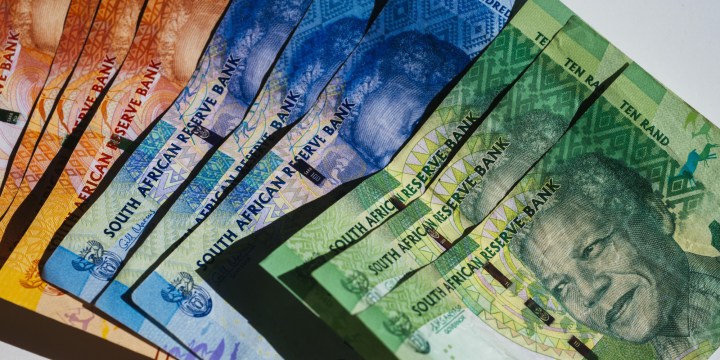ECONOMY ANALYSIS
Q4 GDP data for South Africa likely to signal the start of a recession

The big surge in power blackouts in recent months has the Reuters Econometer forecasting that the country’s economy is contracting — and things might even be worse than predicted.
South Africa’s gross domestic product (GDP) data, due for release on Tuesday, 8 March, will almost certainly show the economy contracted in the fourth quarter (Q4) of 2022 as the intensity of rolling blackouts cranked up.
Given the perception that the economy is almost certainly shrinking this quarter, that will signal the start of a recession – defined by two straight quarters of contracting GDP – setting the tone for a 2023 of low, if any, economic growth.
The Reuters Econometer consensus forecast is that South Africa’s economy contracted 0.5% in Q4 2022 after growing 1.6% in Q3. This is largely – some would say almost exclusively – because of the surge in rolling power cuts late last year. It also forecast a 0.2% contraction in Q1 of this year. In other words, a recession. As we published, the latest consensus figures were not available and could be worse than originally thought.
Visit Daily Maverick’s home page for more news, analysis and investigations
The perception is that things have got worse in the first two months of this year, and though the quarter still has a month to go – and there has only been a sprinkling of indicators so far for the period – there is a sinking feeling the economy is tipping into a recession.
“I think it’s likely we are in a recession,” Jee-A van der Linde, senior economist at Oxford Economics Africa, told DM168.
He pointed to leading indicators such as the Absa Purchasing Managers’ Index (PMI), a monthly survey of purchasing managers employed in manufacturing, which is a key gauge of confidence in the sector.
The Absa PMI contracted sharply in February to 48.1 from 53.0 in January, bringing it back into negative territory below the neutral 50 mark for the first time since September of last year. And the ramped-up scale of power cuts is the major drain on confidence.
“The February survey period included an unprecedented seven consecutive days of Stage 6 load shedding, which was likely top of mind for many respondents,” Absa said.
Coming off the rails
That bodes ill for the manufacturing sector’s contribution to economic growth this quarter. This in itself is not a complete train smash. But some of the subindices point to an economy that is currently coming right off the rails.
The most striking example is the index that measures “expected business conditions in six months’ time”. It collapsed in February to 46.8 from 63.8 in January, a fall of 17 points. It was last lower than this in April 2020, when the economy was in full lockdown meltdown.
The only times it had steeper declines in the past were in September 2001, when airplanes crashed into the twin towers of the World Trade Centre in New York, and in November 2008, when the global financial crisis was in full throttle.
If purchasing managers in a key sector such as manufacturing have lost so much confidence in the space of a month about the outlook six months down the road, you know the economy is in rough shape. And this has nothing to do with a massive terror attack on the world’s largest economy or a global financial calamity. It is a South African collapse, thanks to the power crisis brought to you by the SA government.
Other data also points to the kind of crumbling of confidence that indicates recession. The rand has been on the back foot most of this year to date. Though it put in some mild gains in the early part of the past week – largely because of a global retreat by the dollar – it has mostly been pinned above the R18-to-the-dollar mark of late. It won’t take much to push it back to its historic lows above 19/$.
Growth of around 2.4% for 2022 will probably be the best we can expect for years to come. It’s all downhill from here, at least for the next three years.
And this is unfolding against a cost of living crisis that shows few signs of abating. Although the Consumer Price Index (CPI) braked to 6.9% in January, from 7.2% in December, consumer food inflation accelerated in January to 13.8% from 12.7% in December. This is taking a heavy toll on poor and working-class households against the backdrop of an unemployment rate that was 32.7% in Q4 of last year.
If the economy is indeed in the throes of a recession, the unemployment rate is unlikely to improve this quarter. Meanwhile, South African consumers were hit by another steep hike of R1.27 for petrol at the pump at the start of this month, and a more moderate increase for diesel. This in turn raises the cost of doing business and will hit the bottom line of many struggling companies.
Overall, South Africa’s economy is expected to have expanded by over 2% in 2022, lifted by the 1.6% quarterly growth spurt in Q3. And that is nothing to really cheer about as it represents a sharp slowdown from the 4.9% growth achieved in 2021, which in turn was a rebound from the massive 6.4% contraction of 2020.
And growth of around 2.4% for 2022 will probably be the best we can expect for years to come. It’s all downhill from here, at least for the next three years. South Africa’s Treasury now expects real GDP growth to average only 1.4% from 2023 to 2025, and its forecasts are often optimistic.
The global economy remains fragile, but seemed to be picking up more steam than anticipated just a few months ago as the Chinese economy reopens. The Chinese government’s official PMI reached 52.6 in February, its highest level in over a decade – an indicator that factory activity in the world’s second-biggest economy is revving up fast.
But South Africa remains an outlier because Eskom cannot keep the lights on. DM168
This story first appeared in our weekly Daily Maverick 168 newspaper, which is available countrywide for R25.



















Comments - Please login in order to comment.